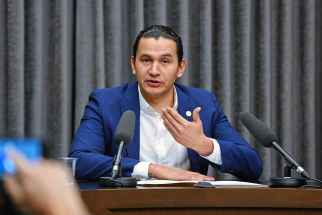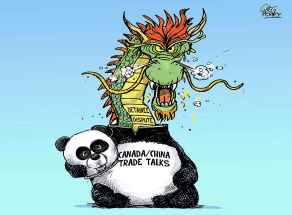NDP unveils plan to counter Manitoba addictions crisis
Read this article for free:
or
Already have an account? Log in here »
To continue reading, please subscribe:
Monthly Digital Subscription
$0 for the first 4 weeks*
- Enjoy unlimited reading on winnipegfreepress.com
- Read the E-Edition, our digital replica newspaper
- Access News Break, our award-winning app
- Play interactive puzzles
*No charge for 4 weeks then price increases to the regular rate of $19.00 plus GST every four weeks. Offer available to new and qualified returning subscribers only. Cancel any time.
Monthly Digital Subscription
$4.75/week*
- Enjoy unlimited reading on winnipegfreepress.com
- Read the E-Edition, our digital replica newspaper
- Access News Break, our award-winning app
- Play interactive puzzles
*Billed as $19 plus GST every four weeks. Cancel any time.
To continue reading, please subscribe:
Add Free Press access to your Brandon Sun subscription for only an additional
$1 for the first 4 weeks*
*Your next subscription payment will increase by $1.00 and you will be charged $16.99 plus GST for four weeks. After four weeks, your payment will increase to $23.99 plus GST every four weeks.
Read unlimited articles for free today:
or
Already have an account? Log in here »
Hey there, time traveller!
This article was published 10/01/2019 (2530 days ago), so information in it may no longer be current.
Long-term efforts to end poverty, buoyed by immediate harm-reduction strategies (such as safe consumption sites), are key in solving Manitoba’s addictions crisis, according to a report assembled by the provincial NDP.
On Thursday, NDP Leader Wab Kinew presented his party’s findings from dozens of interviews with addictions experts, law enforcement and public health officials conducted in December.
Overwhelmingly, those interviewed — who asked to remain anonymous for fear of reprisal at their jobs — reported the province is grappling with more than widespread methamphetamine abuse, Kinew said.

“This is not just a meth crisis, though meth use is the most urgent and emergent reason for us to act on this,” he said. “In fact, this is the same addictions crisis that our province has been fighting going back through pills, going back through alcohol, going back through sniffing gas and solvents.
“And the reason why we don’t see progress in the long term is because our approaches up to now are typically focused on the substance of the day rather than on the bigger addictions crisis.”
Needle budgets blown?
While presenting a report on the root causes of Manitoba’s addictions crisis and possible solutions, NDP Leader Wab Kinew said, in speaking with interviewees, he heard all regional health authorities were expecting to surpass their clean needle budgets for 2018, as demand for harm-reduction supplies skyrocketed.
While presenting a report on the root causes of Manitoba’s addictions crisis and possible solutions, NDP Leader Wab Kinew said, in speaking with interviewees, he heard all regional health authorities were expecting to surpass their clean needle budgets for 2018, as demand for harm-reduction supplies skyrocketed.
Justice Minister Cliff Cullen said the province’s RHAs were directed to keep supplying needles to those in need, regardless of going over-budget.
In December, internal documents from the Winnipeg Regional Health Authority (obtained by the NDP) showed an uptick in blood-borne illnesses, such as Hepatitis B, C and syphilis, directly related to intravenous drug use.
The cost of providing a single clean needle is nine cents, whereas the cost of treating a single patient with Hepatitis C can surpass $40,000 or about $1 million for a patient with HIV, the documents showed.
The Free Press asked each regional health authority whether it had surpassed its needle budget for 2018. Prairie Mountain Health and the WRHA did not respond before deadline Thursday.
Stephanie Verhoeven, regional director of public health-healthy living for the Southern Regional Health Authority, said the SRHA tracks its needle numbers by fiscal year, so could not yet comment.
Its harm-reduction budget for 2018-19 was $12,650; by January, $13,508 was spent. Officials expect the SRHA to spend about $18,000 on harm-reduction supplies by the end of March.
The region distributed 670 needles between September 2016 and March 2017; 36,166 between April 2017 and March 2018; and 48,539 between April and Nov. 20, 2018.
Twyla Storey, spokesperson for the Northern Regional Health Authority, said the NRHA did not have a budget allocated specifically for needle distribution. The NRHA provided 21,790 needles to patients in 2016-17; 40,620 in 2017-18; and 9,880 thus far in 2018-19.
At the Interlake-Eastern Regional Health Authority, Lauralou Cicierski, regional manager of public relations and communications, said the cost of needle kits is tracked by fiscal year. There were 58,888 kits handed out from April 2016 to March 2017; 72,107 from April 2017 to March 2018; and 48,834 from April to Nov. 20, 2018.
“We have seen increased demand for needle kits since the harm-reduction program started (in 2016),” Cicierski said. “This program did exceed its budget for (fiscal year) 2018, and we can attribute that to the needle kit demand, as that is the only aspect of the harm-reduction program that required increased investment.”
— Jessica Botelho-Urbanski
Kinew said governments need to address the root causes of addiction: “Poverty, childhood trauma, systemic barriers.” He highlighted a need for culturally-competent treatment, developed through Indigenous, LGBTTQ* and gender-based lenses; and pressed for a “move away from an abstinence-based education model (for illicit drugs) and instead focus on education as a harm-reduction strategy.”
The NDP’s recommendations, laid out in a 22-page report titled We Have to Start Here: Addressing the Root Causes of Manitoba’s Addictions Crisis and Reducing Harm from Problematic Meth Use, were to be sent to the premier and the health, justice, families and education ministers, Kinew said.
Justice Minister Cliff Cullen said ideas contained in the report were “half-baked and dangerous” in veering away from traditional abstinence campaigns.
“Wab Kinew wants to tell kids it’s okay to do meth and other illicit drugs.” –
Justice Minister Cliff Cullen
“Wab Kinew wants to tell kids it’s okay to do meth and other illicit drugs. I tell you that I’ve raised three boys to adulthood and I’m proud to say that I told them never to use illicit drugs — and they haven’t,” Cullen said.
“I can tell you that our government will continue to warn kids about the dangers of using illicit drugs… The message is quite simple: don’t use drugs.”
In December, the province, along with the City of Winnipeg and the federal government, established an intergovernmental task force to combat illicit drugs and develop prevention strategies.
The group’s first report is due in June. Kinew said he expects it will cover much of the same territory the NDP did.
“If we don’t see similar recommendations, then I think that would be a warning sign of political interference in whatever comes back from this. The reason why I say that is we’re likely talking to many of the same people that the government is talking to,” he said.
“It shouldn’t take six months to take action… because there is such a consensus amongst the experts in Manitoba, it should be a relatively straightforward proposition to ask them what is needed. And it came through loud and clear that people are saying, ‘Well, shift the focus beyond just meth and let’s deal with addiction.'”
Cullen said the intergovernmental task force’s work is underway and it recognized “meth is simply the drug of choice today. In previous years, it’s been fentanyl and cocaine.”wa
“While the NDP play politics and continue to bring forward these half-baked ideas, we will continue to take real action to make our communities safer,” the minister said, calling out the official Opposition for not naming its interviewed sources.
The minister said the province will continue addressing the 120 recommendations made in the Virgo report on mental health and addictions, delivered to government in March 2018.
jessica.botelho@freepress.mb.ca
Twitter: @_jessbu















